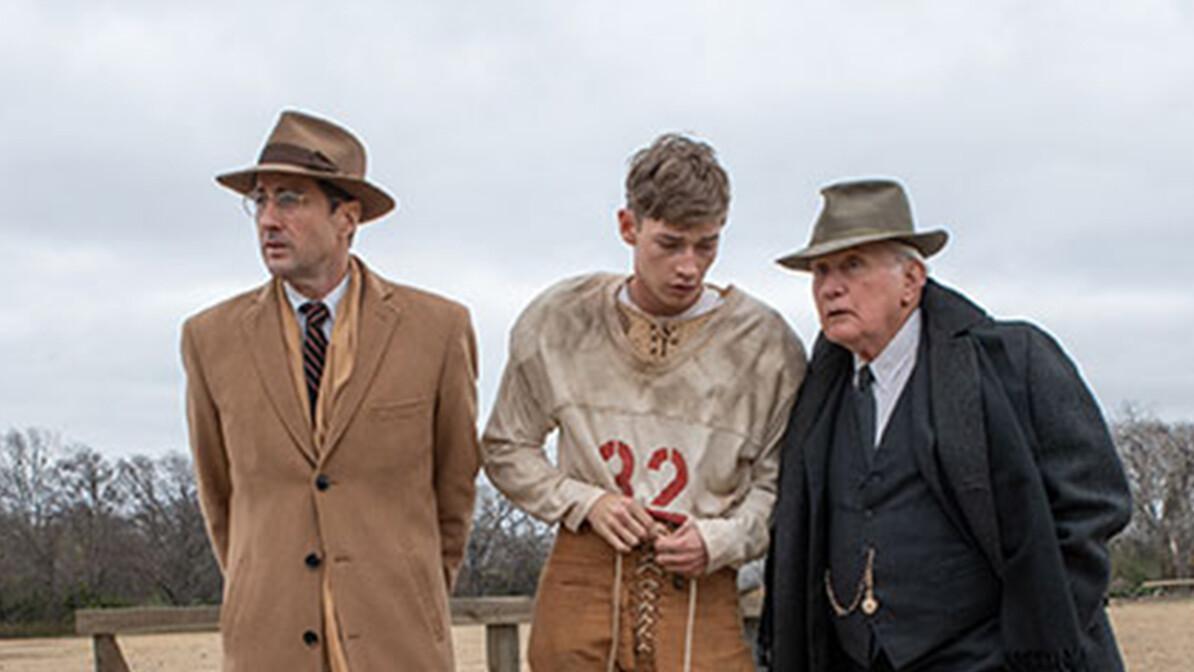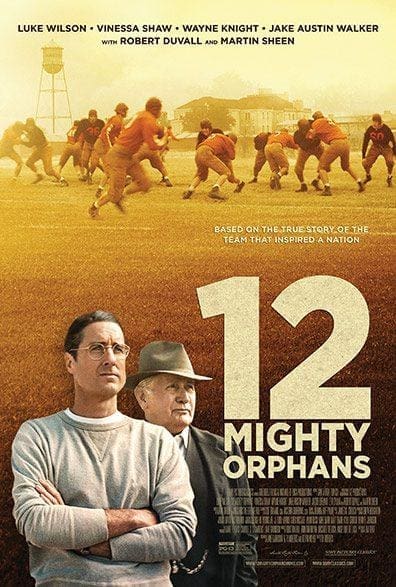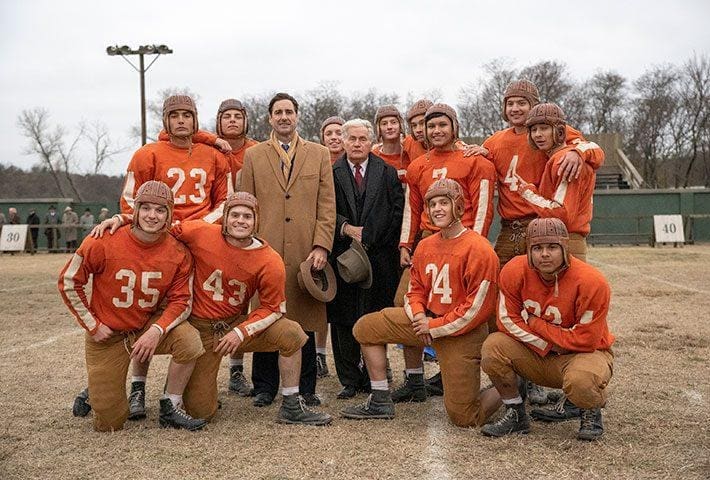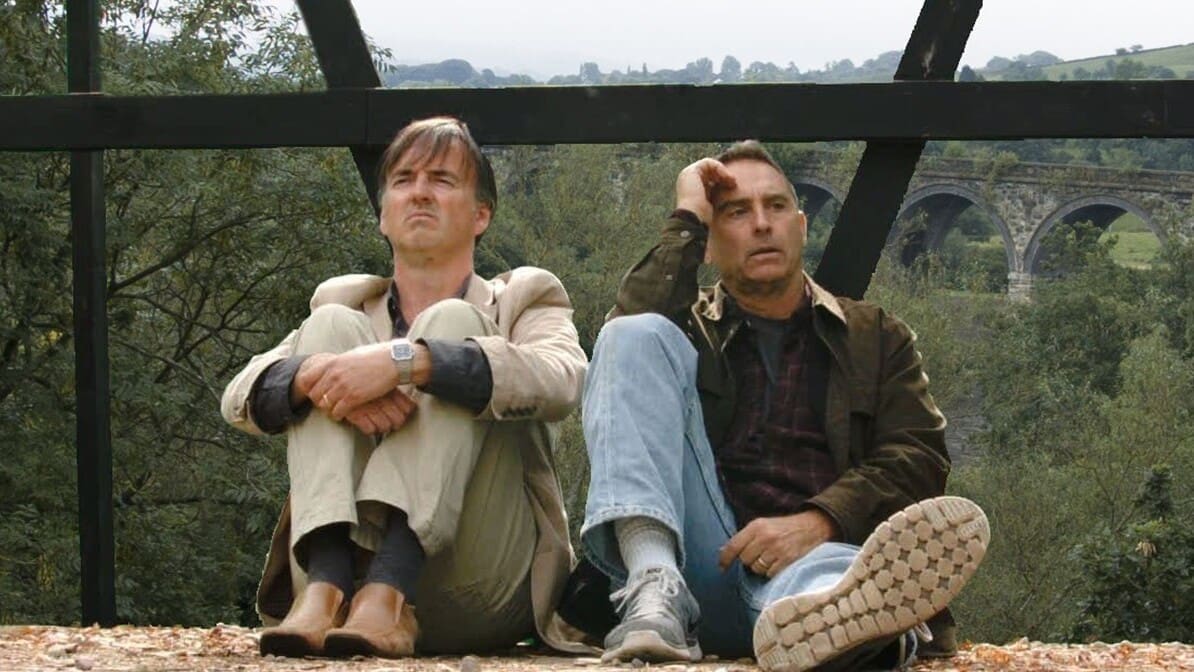- Home
- Entertainment
- 12 Mighty Orphans: Family and Football

12 Mighty Orphans: Family and Football

God places the lonely in families (Psalm 68:6; NLT).
Families come in all shapes and sizes – large, small, nuclear, single-parent, extended, childless, step, and foster.
Most children are born into loving and caring families that provide the nurturing and protection necessary. Unfortunately, that is not always the case.
Sometimes parents or other family members pass away prematurely, leaving no one to take care of their children. Or children are born into situations that are either not safe or healthy for their well-being.
In both cases, kids often get turned over to the state and become wards of the state. Nowadays, many kids in these situations are put into the foster care system. However, in the eighteenth and nineteenth centuries, and on into the first half of the twentieth century, many abandoned children were placed in orphanages.
According to a 1995 report by the Family and Children’s Services Division of the Minnesota Department of Human Services, the first orphanage in the U.S. opened in 1729 in Natchez, Mississippi. Throughout the next 150 years, orphanages became more popular before all but dying out by the middle of the twentieth century.
In Virginia Spence’s article “Do Orphanages Still Exist in America?” on Adoption.com, she explains that orphanages were originally “established to care not only for children whose parents were killed in Indian raids or died in epidemics but also children from families who were unable to care for them due to poverty or addiction. As a result of the population boom, influx of immigrants, and widespread poverty, orphanages were often overcrowded, understaffed, and lacked resources for proper care. While orphanages were better for the children than the streets, they still could not provide what every child needed and deserved—a family environment in which they could grow and thrive.”
From Orphans to Family
Although “family” isn’t a word many people would use to describe orphanages, it’s exactly what twelve orphans were when they came together on their orphanage’s football team and became known as the Masonic Home Mighty Mites.
The true story of this ragtag group of orphans and their inspirational head coach is the subject of the 2021 movie, 12 Mighty Orphans, starring Luke Wilson, Martin Sheen, Robert Duvall, Wayne Knight, Vinessa Shaw, and Jake Austin Walker. The movie is based on the 2008 book, Twelve Mighty Orphans: The Inspiring Story of the Mighty Mites Who Ruled Texas Football, penned by Jim Dent.
The narrator at the beginning of the film states that “orphans were stigmatized as misfits and outcasts and often referred to not as orphans but as inmates. It didn’t matter that they had done nothing wrong. Kids without parents were simply second-class citizens.”
Unfortunately, this isn’t far from the truth for some of the kids at the Masonic Home in Fort Worth, Texas, before Rusty Russell (Wilson) and his wife, Juanita (Shaw), arrive in 1938. At the recommendation of Doc Hall (Sheen), the orphanage hires Rusty away from his cushy head coaching position at Temple (Texas) High School to teach math and science – and serve as the head football coach – and his wife to teach English and music.
Football: The Tie That Binds

Russell quickly learns that coaching football at Masonic Home, which houses only about 150 orphans, is a vastly different experience from Temple. The orphanage doesn’t have the money to purchase uniforms or even a proper football, the number or size of players other high schools in their class have, an appropriate playing field, and other basic necessities to field or support a football team.
Of the twelve players who comprise the Masonic Home’s entire roster, none of them have ever played football and only one of them has held a football. The teams they’re scheduled to play field close to a hundred players, most of them larger than any player on Masonic Home’s sideline. However, this doesn’t determine the football coach. In Texas, after all, football is king, especially high school football.
What they lack in numbers, size, equipment, and facilities, they make up for in heart, determination, and speed. Although there are some growing pains to get to that point.
The twelve boys know first-hand what it’s like to experience loss, hurt, and abandonment. They each were either left at the orphanage by loved ones who could no longer care for them or were sent there after a loved one died. At the institution, the boys are subjected to constant physical and mental abuse at the hands of Frank Wynn (Knight), the manager of the home’s print shop.
Football is their escape, their teammates are their gridiron brothers, and Russell is their father figure. They have nothing to lose, and they play only for each other, often stepping on the field as the David to the other team’s Goliath. Football provides them with the family they’ve always needed … and the support and love that comes with that.
In one poignant scene, after the third game of the season and amidst the growing national popularity of the Mighty Mites, the parents of Wheatie (Slade Monroe), their quarterback, stop by the orphanage to take him home. He tells them that he’s already home. In response, his mom slaps his face three times. After his parent’s leave, Wheatie’s teammates rush to his side to make sure their brother is okay. He’d rather stay with his surrogate family at the orphanage than leave with his blood family.
With so many odds working against Russell and the Mighty Mites, 12 Mighty Orphans is a compelling underdog story that will have you cheering for them every time they take the field and every time they’re met with hardship off the field. Throughout it all, they learn perseverance, loyalty, friendship, football, and what it’s like to finally have a family that is always there for you.
12 Mighty Orphans is rated PG-13 for violence, language, some suggestive references, smoking, and brief teen drinking.
Trending Now
Sign up today for your Inspiration Today Daily Newsletter
Supercharge your faith and ignite your spirit. Find hope in God’s word. Receive your Inspiration Today newsletter now!
John Farrell
John Farrell is the Digital Content Manager for inspiration.org. In addition to having written more than 1,000 articles, press releases, and other pieces of content for Inspiration Ministries, NASCAR, Lionel, and Speed Digital, he authored The Official NASCAR Trivia Book: With 1,001 Facts and Questions to Test Your Racing Knowledge in 2012. John is a graduate of Appalachian State University and lives in Concord, N.C., with his wife and two sons.
Related Articles
April 19, 2024
Navigating the Digital Storm: 5 Tips for Mentoring Kids’ Faith
In an age where screens dominate our daily lives, parents face a daunting challenge: How can we…
April 19, 2024
Unashamed: Take Me As I Am
Excerpt from “Chapter 5: Take Me As I Am” of Unashamed by Lecrae The final night of the…
April 18, 2024
Movie Review: Grace and Gravity
According to a report published by the Centers for Disease Control and Prevention (CDC) and posted…
April 16, 2024
‘It Is Well with My Soul’
“It Is Well With My Soul” is a hymn that may bring peace and comfort when considering the peace…
Next Steps To Strengthen Your Walk
Submit A Prayer Request
We are here for you. Simply click on the button below to reach us by form, email or phone. Together we will lift our hearts and voices with you in prayer.
Partner WIth Us
Sow a seed of faith today! Your generous gift will help us impact others for Christ through our global salvation outreach and other faith based initiatives.
Inspiration TV
Watch Christian content from your favorite pastors, christian movies, TV shows and more.






